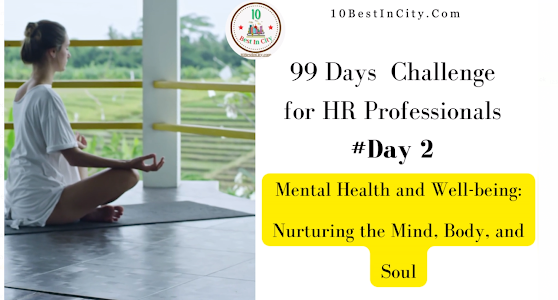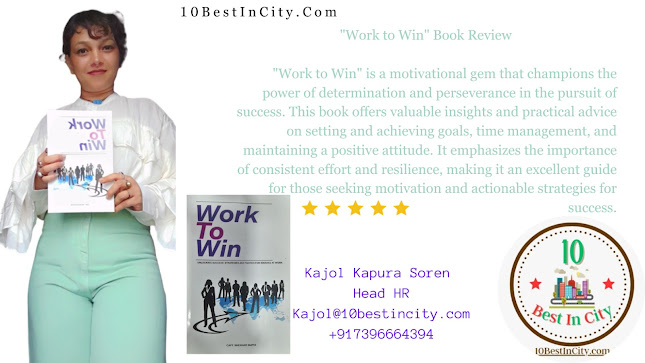99 Days Challenge for HR Professionals
#Day 2
Mental Health and Well-being: Nurturing the Mind, Body, and Soul
In an era defined by the relentless pace of modern life, the significance of mental health and well-being cannot be overstated. This comprehensive article delves into the multifaceted aspects of mental health, exploring its importance, the factors that influence it, and practical strategies for nurturing mental, emotional, and physical well-being.
Mental health and well-being are foundational cornerstones of a fulfilling and purposeful life. In today's fast-paced world, where external pressures often take precedence, taking the time to understand, prioritize, and nurture mental health is more critical than ever before. This article embarks on a journey to explore the various dimensions of mental health and well-being, offering insights, strategies, and resources for individuals seeking a balanced, healthy, and joyful life.
Section 1: Understanding Mental Health
1.1 What Is Mental Health?
Mental health is a state of emotional and psychological well-being in which an individual can effectively cope with the challenges of life, work productively, maintain fulfilling relationships, and make sound decisions. It encompasses emotional resilience, self-awareness, and the ability to manage stress and adapt to change.
1.2 The Importance of Mental Health
Understanding the significance of mental health is paramount. Healthy mental well-being is linked to improved physical health, better relationships, and increased productivity. It is the foundation upon which a fulfilling and meaningful life is built.
1.3 Common Mental Health Disorders
This section explores prevalent mental health disorders such as anxiety, depression, and bipolar disorder. It provides insights into their symptoms, causes, and potential treatment options, emphasizing the importance of seeking professional help when needed.
Section 2: Factors Influencing Mental Health
2.1 Biological Factors
Biological factors play a significant role in mental health. Genetics, brain chemistry, and hormonal imbalances can influence an individual's susceptibility to mental health disorders. This section delves into the biological underpinnings of mental health.
2.2 Environmental Factors
Environmental factors, including early life experiences, trauma, and exposure to chronic stress, can impact mental health. Understanding these factors helps individuals navigate their impact and seek appropriate support.
2.3 Psychological Factors
This section explores the role of psychological factors such as self-esteem, coping strategies, and resilience in mental well-being. It offers practical tips for strengthening psychological resilience and emotional intelligence.
2.4 Sociocultural Factors
Sociocultural factors, including cultural norms, societal stigma, and access to resources, can shape mental health outcomes. Recognizing and addressing these factors is vital for promoting mental health equity.
Section 3: Strategies for Nurturing Mental Health
3.1 Self-Care and Stress Management
Self-care practices, such as mindfulness, relaxation techniques, and time management, are essential for reducing stress and promoting mental well-being. This section provides actionable steps for incorporating self-care into daily life.
3.2 Building Resilience
Resilience is the ability to bounce back from adversity. Learn how to build resilience through strategies like cognitive reframing, problem-solving, and seeking social support.
3.3 Healthy Relationships
Healthy relationships are fundamental to mental health. This section explores effective communication, conflict resolution, and boundaries, fostering positive connections with others.
3.4 Physical Activity and Nutrition
Physical health and mental health are interconnected. Discover the benefits of regular exercise, balanced nutrition, and sleep for overall well-being.
3.5 Seeking Professional Help
Recognizing when to seek professional help is a crucial step in managing mental health. This section provides guidance on finding the right mental health professional and understanding treatment options.
Section 4: Mental Health Across the Lifespan
4.1 Children and Adolescents
Children and adolescents face unique mental health challenges. Learn about early intervention, the impact of technology, and effective parenting strategies for promoting mental health in young individuals.
4.2 Adults and Working Professionals
Balancing work, family, and personal life can strain mental health. This section explores workplace stress, burnout, and strategies for maintaining mental well-being in adulthood.
4.3 Aging Gracefully
Aging brings its own set of mental health considerations. Discover how to navigate issues such as retirement, loneliness, and cognitive health as individuals age gracefully.
Section 5: Destigmatizing Mental Health
5.1 The Role of Education
Education is a powerful tool in destigmatizing mental health. This section emphasizes the importance of mental health literacy and awareness campaigns.
5.2 Sharing Personal Stories
Personal stories of resilience and recovery can break down barriers and reduce stigma. Hear from individuals who have overcome mental health challenges.
Section 6: Resources for Mental Health Support
6.1 Helplines and Crisis Intervention
This section provides a list of helplines and crisis intervention services for individuals in immediate need of mental health support.
6.2 Online Communities and Support Groups
Online communities and support groups offer a safe space for individuals to connect, share experiences, and access valuable resources.
6.3 Professional Organizations and Treatment Centers
Explore professional organizations and treatment centers that specialize in mental health and well-being.
Kajol Kapura Soren
HR Head
10BestInCity.com
https://kajolkapurasoren.vcardinfo.com
Facebook:
https://www.facebook.com/kapurakajol
Instagram:
https://www.instagram.com/kajolsoren
Linkedin:
https://www.linkedin.com/in/kajols
Pinterest:
https://in.pinterest.com/kajolks14
Twitter:
https://twitter.com/KajolSoren4
Quora:
https://www.quora.com/profile/Kajol-Soren
V Card :
https://kajolkapurasoren.vcardinfo.com
Bio:
https://www.portrait-business-woman.com/2023/07/kajol-kapura-head-hr-10bestincitycom.html
https://www.anxietyattak.com/2023/09/day-1-artificial-intelligence-ai-and-hr.html




.jpg)